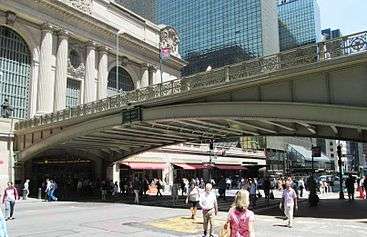Pershing Square, Manhattan
Coordinates: 40°45′07.6″N 73°58′39.6″W / 40.752111°N 73.977667°W


Pershing Square, in Manhattan, New York City, is the intersection of Park Avenue and 42nd Street in front of Grand Central Terminal. The main roadway of Park Avenue crosses over 42nd Street on the Park Avenue Viaduct, also known as the Pershing Square Viaduct,[1] but two ramps, northbound and southbound, connect the two streets.
The square is named after General John J. Pershing, and was originally intended to be an open plaza in Pershing's honor occupying the entire block between 42nd and 41st Streets and Park and Lexington Avenues; plans for this were first circulated in 1919.[1] In 1920, some of the land that had been intended to be Pershing Square was sold to a real estate development company, which put up an office building called the Pershing Square Building, completed in 1923. As a result, "Pershing Square" now refers to the area immediately under and around the viaduct.[1]
In 1939, the city built a steel and glass-brick structure under the viaduct at the south end of Pershing Square from 42nd Street to 41st Street,[2] which it utilized to provide tourist information.[3] The building, at 90 East 42nd Street, was later converted into a restaurant, which, as of 2015, is called the Pershing Square Cafe.
See also
References
Notes
- 1 2 3 "Pershing Square Viaduct Designation Report", New York City Landmarks Preservation Commission (September 23, 1980)
- ↑ "90 East 42nd Street" on the New York City Geographic Information System map
- ↑ Federal Writers' Project (1939), New York City Guide, New York: Random House, ISBN 0-403-02921-X (Reprinted by Scholarly Press, 1976; often referred to as WPA Guide to New York City), p.222
External links
